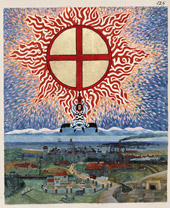Carl Jung - Quotes and phrases
Psyche
Only the man who can consciously assent to the power of this inner voice becomes a personality. (The development of personality)
The call of this inner voice is not seen as completely pleasant: both great evil and great good are contained therein. (The development of personality)
What appears to be random behavior is actually the result of differences in the way people prefer to use their mental capacities. (Psychological Types)
Man is a gateway, through which from the outer world of gods, daemons, and souls ye pass into the inner world; out of the greater into the smaller world. (Septem Sermones ad Mortuos)
Everything that irritates us about others can lead us to an understanding of ourselves. (Memories, Dreams, Reflections)
Anyone who adopts the standpoint of instinct will have no difficulty in discovering in them the "wish-fulfillment," the "infantile wish," the "repressed sexuality." And the man who adopts the standpoint of the ego can just as easily discover those elementary aims concerned with the security and differentiation of the ego, since fantasies are mediating products between the ego and the instincts. Accordingly they contain elements of both sides. Interpretation from either side is always somewhat forced and arbitrary, because one side is always suppressed. (Psychological Types)
The unconscious is seen as the completion and enrichment of the personality, having a superior insight and knowledge lacking in the conscious self. (Psychology and religion)
I am convinced that exploration of the psyche is the science of the future… This is the science we need most of all, for it is gradually becoming more and more obvious that neither famine nor earthquakes nor microbes nor carcinoma, but man himself is the greatest peril to man, just because there is no adequate defense against psychic epidemics, which cause infinitely more devastation than the greatest natural catastrophes.
Society and life
People tend to look for the Kingdom of God in the outer world rather than in their own souls. (Man and His Environment)
In general it can be said that for modern man technology is an imbalance that begets dissatisfaction with work or with life. It estranges man from his natural versatility of action and thus allows many of his instincts to lie fallow. The result is an increased resistance to work in general. (A Letter to the Zurcher Student)
My life is what I have done, my scientific work; the one is inseparable from the other. The work is the expression of my inner development; for commitment to the contents of the unconscious forms the man and produces his transformations. My works can be regarded as stations along my life's way. (Memories, Dreams, Reflections)
But what a dreary world it would be if the rules were not violated sometimes! (Memories, Dreams, Reflections)
We always require an outside point to stand on, in order to apply the lever of criticism. This is especially so in psychology, where by the nature of the material we are much more subjectively involved than in any other science. (Memories, Dreams, Reflections)
Education
The fact that schools too often neglect the gifted child in their preoccupation with educating the slow, is not considered harmful to the former, since genius, unlike talent, can neither be hindered nor helped. (The gifted child)
The development of the child's psyche is influenced more by the warmth and personal example of the individual teacher than by the school curriculum. (The gifted child)
Myths and mystery
The real mystery does not behave mysteriously or secretively; it speaks a secret language, it adumbrates itself by a variety of images which all indicate its true nature. (Psychology and Alchemy)
Myths that present the threatening forces surrounding the birth of the hero and the heroic life are seen as expressions of an awareness of the dangers surrounding the attempt to become a personality. (The development of personality)
I am busy exploring the truth in which Indians believe. It always impressed me as a great truth. (quoted in Berger & Segaller, 2000)
Religion
Religion must be taken into account by psychologists, since it represents one of the most ancient and universal expressions of the human mind; but it is felt that the approach of psychology must be scientific, empirical and phenomenological rather than philosophical or metaphysical. (Psychology and religion)
Some of the archetypal symbols which have correlates in religion are discussed. A circle divided into four parts, the Philosopher's Stone, is a symbol that seems to recur throughout history. (Psychology and religion)
To colleagues
The psychologist must depend therefore in the highest degree upon historical and literary parallels if he wishes to exclude at least the crudest errors in judgment. (Memories, Dreams, Reflections)
We achieve knowledge of nature only through science, which enlarges consciousness; hence deepened self-knowledge also requires science, that is, psychology. No one builds a telescope or microscope with one turn of the wrist, out of good will alone, without any knowledge of optics. (Memories, Dreams, Reflections)
Septem Sermones ad Mortuos
I begin with nothingness. Nothingness is the same as fullness. In infinity full is no better than empty. Nothingness is both empty and full.
Every so-called fixed and certain thing is only relative. That alone is fixed and certain which is subject to change.
Our very nature is distinctiveness. If we are not true to this nature we do not distinguish ourselves enough. Therefore must we make distinctions of qualities.
Good and evil are united in the increase of the tree. In their divinity stand life and love opposed.
